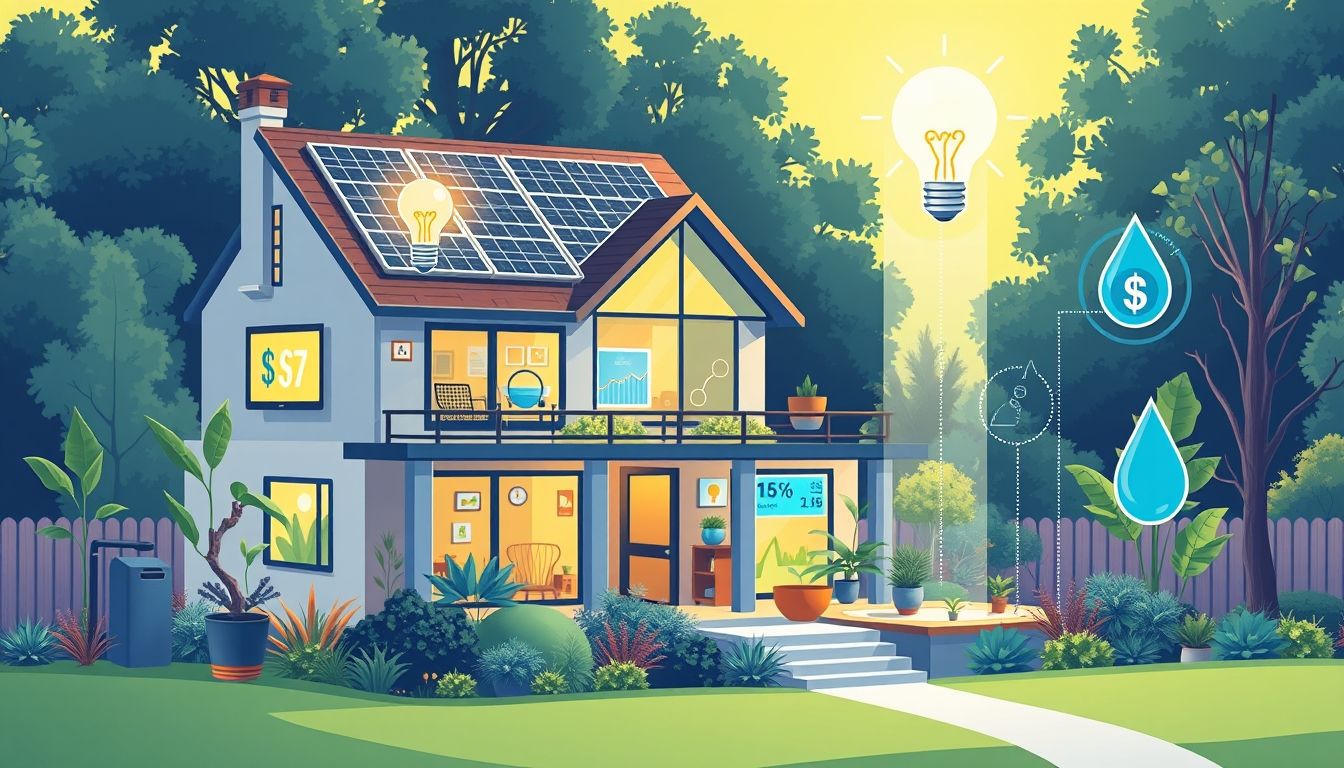Introduction: Why Should We Care About Saving Money on Utility Bills?
In today's world, where the cost of living is constantly increasing, it's essential to find innovative ways to reduce monthly expenses. Basic utility bills such as electricity, water, and phone represent a significant portion of a household's budget and can have a major impact on our ability to save and invest. This article provides you with a comprehensive guide on how to save money on these bills, focusing on practical and applicable strategies.
Chapter 1: Understanding Your Bills: The First Step Towards Saving
Before starting to implement any strategy, it's necessary to understand the details of your bills. Look at your recent bills and try to identify patterns in your consumption. Does your consumption increase at certain times of the day or month? Are there any unexpected charges? Understanding these details will help you identify areas where you can make changes.
Analyzing the Electricity Bill
- Reading the Meter: Learn how to read your electricity meter. This will help you track your daily and weekly consumption.
- Understanding Charges: Understand the different types of charges on your bill, such as consumption charges, service charges, and taxes.
- Comparing Bills: Compare your monthly bills to identify periods when consumption increases.
Analyzing the Water Bill
- Reading the Meter: Learn how to read your water meter.
- Identifying Leaks: Look for any signs of leaks in your home.
- Comparing Bills: Compare your monthly bills to identify periods when consumption increases.
Analyzing the Phone Bill
- Reviewing Call Details: Review the call details on your bill to ensure there are no unauthorized charges.
- Understanding Your Plan: Make sure your current plan suits your needs.
- Comparing Offers: Compare offers from different telecommunications companies to get the best price.
Chapter 2: Saving Electricity: Effective and Proven Strategies
Electricity is one of the biggest sources of expenditure in most homes. Here are some effective strategies to save electricity:
Replacing Traditional Bulbs with LED Bulbs
LED bulbs consume up to 75% less energy than traditional bulbs and last longer. This means significant savings on your electricity bill in the long run.
Using Energy-Efficient Appliances
When buying new appliances, look for appliances with the "Energy Star" label or its equivalent in your country. These appliances are designed to consume less energy.
Unplugging Appliances When Not in Use
Appliances consume energy even when they are in standby mode. Unplug appliances when not in use to save energy.
Using a Smart Thermostat
A smart thermostat can help you control energy consumption in heating and cooling. You can set it to automatically lower the temperature when you are away from home or at night.
Improving Home Insulation
Good insulation prevents heat loss in winter and heat entry in summer, reducing the need for heating and cooling.
Chapter 3: Saving Water: Simple Steps Make a Big Difference
Water is a precious resource that must be conserved. Here are some ways to save water in your home:
Fixing Leaks
Even small leaks can cause large amounts of water to be wasted in the long run. Repair any leaks in faucets, toilets, and pipes as soon as possible.
Installing Water-Efficient Showerheads and Toilets
Water-efficient showerheads and toilets are designed to reduce the amount of water used without affecting performance.
Reducing Shower Time
Try to reduce your shower time by a few minutes. Even small changes can make a big difference.
Using Water-Efficient Washing Machines and Dishwashers
When buying a new washing machine or dishwasher, look for appliances with the "WaterSense" label or its equivalent in your country. These appliances are designed to consume less water.
Collecting Rainwater
You can collect rainwater and use it to water plants or wash the car.
Chapter 4: Saving Money on Your Phone Bill: Smart and Innovative Solutions
With technological advancements, there are many ways to save money on your phone bill:
Reviewing Your Current Plan
Make sure your current plan suits your needs. If you are not using all the data or minutes available to you, you may be paying for services you don't need.
Comparing Offers from Different Telecommunications Companies
Compare offers from different telecommunications companies to get the best price. You may find a company that offers a similar plan at a lower price.
Using Internet Calling Apps
Apps like WhatsApp, Skype, and Viber allow you to make free calls and send messages over the internet.
Turning Off Cellular Data When Not in Use
If you are using Wi-Fi most of the time, turn off cellular data to avoid unnecessary data consumption.
Avoiding Unnecessary International Calls
International calls can be very expensive. Use internet calling apps or look for discounted international plans if you need to make international calls regularly.
Chapter 5: Additional Tips for Saving Money on Utility Bills
Here are some additional tips that can help you save money on utility bills:
Participating in Savings Programs Offered by Utility Companies
Many utility companies offer savings programs that can help you lower your bills. Look for these programs and sign up for them.
Monitoring Your Consumption Regularly
Monitor your consumption regularly and try to identify areas where you can make changes.
Budgeting for Utility Bills
Set a budget for utility bills and try to stick to it. This will help you control your expenses.
Investing in Energy-Efficient Appliances
Although energy-efficient appliances may be more expensive initially, they will save you money in the long run.
Changing Your Daily Habits
Even small changes in your daily habits can make a big difference in your bills.
Chapter 6: Real-World Examples from the Arab and Global Markets
Let's take a look at some real-world examples of how savings strategies are being applied in the Arab and global markets:
Saudi Arabia: Energy Efficiency Program
Saudi Arabia has launched a national energy efficiency program aimed at raising consumer awareness about the importance of rationalizing energy consumption and providing incentives to encourage the use of energy-efficient appliances.
United Arab Emirates: "Qatra" Initiative
The United Arab Emirates has launched the "Qatra" initiative to rationalize water consumption in homes and commercial buildings.
Egypt: Awareness Campaigns to Rationalize Electricity Consumption
The Egyptian government is conducting continuous awareness campaigns to encourage citizens to rationalize electricity consumption.
United States of America: Energy Star Program
The Energy Star program is a U.S. government program aimed at helping consumers choose energy-efficient appliances.
Germany: Support for Renewable Energy
The German government supports the use of renewable energy by providing financial incentives to citizens and companies.
Chapter 7: The Environmental and Economic Impact of Saving Money on Utility Bills
Saving money on utility bills not only benefits your budget but also has positive impacts on the environment and the economy:
Environmental Impact
- Reducing Carbon Emissions: Reducing energy consumption reduces carbon emissions that contribute to climate change.
- Conserving Natural Resources: Rationalizing water consumption conserves this precious resource.
- Reducing Pollution: Reducing energy and water consumption reduces pollution from energy production and water treatment.
Economic Impact
- Saving Money: Saving money on utility bills increases your disposable income.
- Stimulating the Economy: Saving money can lead to increased consumer spending and investment.
- Creating Jobs: Investing in renewable energy and energy efficiency can create new jobs.
Chapter 8: Tools and Technologies for Monitoring Energy and Water Consumption
There are many tools and technologies that can help you monitor energy and water consumption in your home:
Smart Electricity Meters
Smart electricity meters provide detailed data on your energy consumption in real-time.
Energy Consumption Monitoring Apps
There are many apps that can help you track energy consumption in your home and provide tips for saving.
Water Sensors
Water sensors can detect leaks in your home and alert you to them.
Home Energy Management Systems
Home energy management systems can help you control energy consumption in your home automatically.
Chapter 9: Common Challenges and How to Overcome Them
You may face some challenges when trying to save money on utility bills. Here are some common challenges and how to overcome them:
Difficulty Changing Habits
It can be difficult to change old habits. Start with small, gradual changes, and be patient with yourself.
High Cost of Energy-Efficient Appliances
Energy-efficient appliances may be more expensive initially, but they will save you money in the long run. Look for deals and discounts.
Lack of Sufficient Information
It can be difficult to find reliable information on how to save money on utility bills. Look for reliable sources and consult experts.
Chapter 10: Conclusion: The Future of Saving on Utility Bills
Saving money on utility bills is not just a way to reduce monthly expenses, but also an investment in a better future for the environment and the economy. By applying the strategies and tips in this article, you can achieve significant savings on your bills and contribute to building a more sustainable world.
In the future, technology is expected to play a greater role in saving money on utility bills. Smart devices and home energy management systems will become more widespread, and will help consumers control their energy and water consumption more effectively.
Important Note: The information in this article is for informational purposes only and does not constitute financial advice. Consult a financial expert before making any investment decisions.




